#McDonnell Aircraft Corporation
Explore tagged Tumblr posts
Text


Gemini Spacecraft under construction at the McDonnell factory in St. Louis, Missouri.
Science Photo Library: C007/7839, C007/7843
#Gemini Capsule#Gemini Program#Project Gemini#construction#McDonnell Aircraft Corporation#St. Louis#Missouri#1960s#my post
78 notes
·
View notes
Link
The article by Peter Suciu on "The Armory Life" discusses the McDonnell XF-85 Goblin, a prototype "parasite" fighter jet developed during the Cold War by the U.S. Air Force. Intended to provide protection for bombers beyond the range of conventional escorts, it was designed to deploy from bombers mid-flight, such as the Convair B-36 Peacemaker and initially tested with a Boeing B-29 Superfortress. The Goblin's design included innovative features like foldable wings and a trapeze deployment system, but the project faced critical challenges, including difficulty in recovery due to turbulent air and limited flight endurance. Only two prototypes were built before the program was canceled, and the article explores the project's historical context, its technological ambitions, and subsequent efforts in developing parasite fighters, emphasizing the rapid advancement of Soviet fighter technologies and the transition to more promising aerial refueling techniques. The article also reflects on the legacy of the XF-85 Goblin and the potential future of unmanned collaborative combat aircraft concepts.
#McDonnell XF-85 Goblin#parasite fighter#B-36 bomber#Convair B-36 Peacemaker#McDonnell Aircraft Corporation#Frank Everest#Bell X-1#ejection seat#air defense#Cold War#U.S. Air Force#1948#aerodynamic design#retractable fuselage#wingtip tanks#flight testing#XF-85 prototype#rocket engine#airspeed#performance#manned interception.
0 notes
Text

46 more blasts at the Axis... thanks to plastic.
#vintage advertising#wartime ads#wwii#ww2#ww#life during wartime#mcdonnell aircraft corporation#vintage aircraft#ww2 aircraft#warplanes#vintage illustration
1 note
·
View note
Text
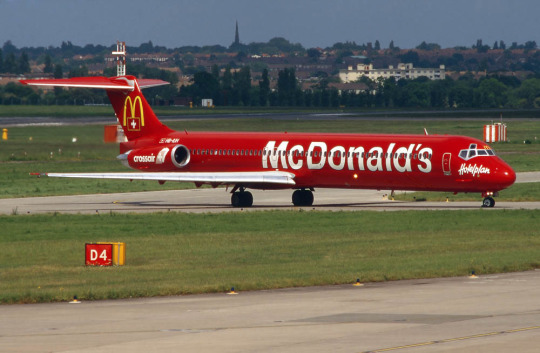
"McPlane"
#McDonnell Douglas#MD-83#Corporate aircraft#Airliner#McDonald's jet#McPlane#Commercial aviation#Airplane#MD-80#Passenger jet
50 notes
·
View notes
Video
youtube
Boeing Is Everything Wrong With American Capitalism
Excuse my language, but why is Boeing such a shitty corporation?
Their planes are literally falling apart in the sky.
At least six Boeing planes have had parts fall off this year — including an exit door in mid-flight. A whistle-blower has accused Boeing of a “criminal cover-up” of its safety failures.
But beyond this one company, Boeing’s descent is a case study in how American capitalism has become so rotten. Let me explain.
I’m old enough to remember when people used to say “If it’s not Boeing, I’m not going.”
But in 1997, everything changed when Boeing merged with McDonnell Douglas and became the only major maker of commercial aircraft in America. With no domestic rivals, it no longer needed to stay on the cutting edge of innovation.
Executives at Boeing who once specialized in engineering were replaced with Wall Street types who looked down on the engineers. One money-hungry CEO described those who cared too much about the integrity of Boeing’s planes, and not enough about its stock price, as “phenomenally talented assholes.”
To keep Wall Street happy, Boeing began spending billions on stock buybacks that pumped up the value of shares — money that could have been spent on safety and innovation.
It doled out hundreds of millions on campaign contributions and lobbying to lower safety standards, rake in massive government contracts, and boost its bottom line.
To cut costs, Boeing outsourced roughly 70% of its design, engineering, and manufacturing rather than rely on its experienced union workforce.
To further undercut its union, Boeing opened an assembly plant in South Carolina, a notorious anti-union state. Executives reportedly told managers not to move any unionized employees there.
This quest for profit resulted in massive quality control problems that were reported by engineers and machinists, but allegedly ignored by management. All of this inevitably led to the deadly safety issues Boeing faces today.
And because of Boeing’s monopoly-like power, it has been largely immune from any repercussions for its poor performance.
Boeing made it seem like it was punishing executives who led it astray by firing them, but still rewarded them with “golden parachutes” on the way out.
Folks, Boeing’s troubles should serve as a cautionary tale. It’s reflective of broader trends in our economy over the past forty years. Monopolization. Wealth siphoned off to rich shareholders at the expense of everyone else. Cutting corners on safety to save a dime. Bashing unions. All while spending big money lobbying the government.
Boeing may have become a shitty company, but that doesn’t mean we have to put up with it.
The government has the power to increase antitrust enforcement to bust up big companies — something that we are already starting to see in other industries.
It should also attach strings to government contracts and subsidies to ensure that private corporations are working in the best interest of the country, and not just their bottom lines.
It should ban stock buybacks, which were illegal before the Reagan administration, so profits are put back into improving the company, including the safety of products, rather than solely padding investors’ wallets.
Union power should be rebuilt, so that workers can once again act as a countervailing force to Wall Street.
And we should continue the fight to get Big Money out of politics.
It’s not too late to reverse course and chart a new flight path.
499 notes
·
View notes
Text
Family portrait...

FH-1 Phantom I and F-4 Phantom II, AV-8B Harrier, F-101 Voodoo, F-15 Eagle, F/A-18 Hornet, and F2H Banshee at the McDonnell-Douglas St. Louis, MO plant.
Through a complicated series of corporate buyouts and mergers, the AV-8B, F-15 and F/A-18 are now Boeing aircraft.
152 notes
·
View notes
Text
Boeing, Spirit and Jetblue, a monopoly horror-story
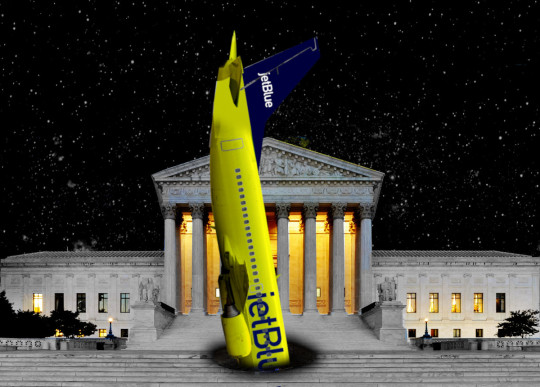
Catch me in Miami! I'll be at Books and Books in Coral Gables TONIGHT (Jan 22) at 8PM. Berliners: Otherland has added a second date (Jan 28) for my book-talk after the first one sold out - book now!

Last week, William Young, an 82 year old federal judge appointed by Ronald Reagan, blocked the merger of Spirit Airlines and Jetblue. It was a seismic event:
https://storage.courtlistener.com/recap/gov.uscourts.mad.254267/gov.uscourts.mad.254267.461.0_6.pdf
Seismic because the judge's opinion is full of rhetoric associated with the surging antitrust revival, sneeringly dismissed by corporate apologists as "hipster antitrust." Young called America's airlines and "oligopoly," a situation he blamed on out-of-control mergers. As Matt Stoller writes, this is the first airline merger to be blocked by the DOJ and DOT since deregulation in 1978:
https://www.thebignewsletter.com/p/antitrust-enforcers-block-the-jetblue
The judge wasn't shy about why he was reviving a pre-Jimmy Carter theory of antitrust: "[the merger] does violence to the core principle of antitrust law, 'to protect] markets –- and its market participants — from anticompetitive harm."
The legal arguments the judge advances are fascinating and worthy of study:
https://twitter.com/johnmarknewman/status/1747343447227519122
But what really caught my eye was David Dayen's American Prospect article about the judge's commentary on the state of the aviation industry:
https://prospect.org/infrastructure/transportation/01-19-2024-how-boeing-ruined-the-jetblue-spirit-merger/
Why, after all, have Spirit and Jetblue been so ardent in pursuing mergers? Jetblue has had two failed merger attempts with Virgin, and this is the third time they've failed in an attempt to merge with Spirit. Spirit, meanwhile, just lost a bid to merge with Frontier. Why are these two airlines so obsessed with combining with each other or any other airline that will have them?
As Dayen explains, it's because US aviation has been consumed by monopoly, hollowed out to the point of near collapse, thanks to neoliberal policies at every part of the aviation supply-chain. For one thing, there's just not enough pilots, nor enough air-traffic controllers (recall that Reagan's first major act in office was to destroy the air traffic controller's union).
But even more importantly, there are no more planes. Boeing's waitlist for airplane delivery stretches to 2029. And Boeing is about to deliver a lot fewer planes, thanks to its disastrous corner-cutting, which grounded a vast global fleet of 737 Max aircraft (again):
https://prospect.org/infrastructure/transportation/2024-01-09-boeing-737-max-financial-mindset/
The 737 disaster(s) epitomize the problems of inbred, merger-obsessed capitalism. As Luke Goldstein wrote, the rampant defects in Boeing's products can be traced to the decision to approve Boeing's 1997 merger with McDonnell-Douglas, a company helmed by Jack Welch proteges, notorious for cost-cutting at the expense of reliability:
https://prospect.org/infrastructure/transportation/2024-01-09-boeing-737-max-financial-mindset/
Boeing veterans describe the merger as the victory of the bean-counters, which led to a company that chases short-term profits over safety and even the viability of its business:
https://www.airliners.net/forum/viewtopic.php?t=213075
After all, the merger turned Boeing into the single largest exporter in America, a company far too big to fail, teeing up tens of billions from Uncle Sucker, who also account for 40% of Boeing's income:
https://www.thebignewsletter.com/p/its-time-to-nationalize-and-then
The US government is full of ex-Boeing execs, just as Boeing's executive row is full of ex-US federal aviation regulators. Bill Clinton's administration oversaw the creation of Boeing's monopoly in the 1990s, but it was the GOP that rescued Boeing the first time the 737 Maxes started dropping out of the sky.
Boeing's biggest competitor is the state-owned Airbus, a joint venture whose major partners are the governments of France, Spain and Germany – governments that are at least theoretically capable of thinking about the public good, not short-term profits. Boeing's largest equity stakes are held by the Vanguard Group, Vanguard Group subfiler, Newport Trust Company, and State Street Corporation:
https://prospect.org/blogs-and-newsletters/tap/2024-01-18-airbus-advantage/
As Matt Stoller says, America has an airline that the public bails out, protects, and subsidizes but has no say over. Boeing has all the costs of public ownership and none of the advantages. It's the epitome of privatized gains and socialized losses.
This is Reagan's other legacy, besides the disastrous shortage of air-traffic controllers. The religious belief in deregulation – especially deregulation of antitrust enforcement – leads to a deregulated market. It leads to a market that is regulated by monopolists who secretly deliberate, behind closed board-room doors, and are accountable only to their shareholders. These private regulators are unlike government regulators, who are at least nominally bound by obligations to transparency and public accountability. But they share on thing in common with those public regulators: when they fuck up, the public has to pay for their mistakes.
It's a good thing Boeing's executives are too big to fail, because they fail constantly. Boeing execs who are warned by subcontractors of dangerous defects in their planes order those subcontractors to lie, or lose their contracts:
https://www.levernews.com/boeing-supplier-ignored-warnings-of-excessive-amount-of-defects-former-employees-allege/
As a result of Boeing's mismanagement, America's only aircraft supplier steadily has lost ground to Airbus, which today enjoys a 2:1 advantage over Boeing. But it's not just Boeing that's the weak link aviation. US aviation is a chain entirely composed of weak links.
Take jet engines: Pratt & Whitney are Spirit's major engine supplier, but these engines suck as much as Boeing's fuselages. Much of Spirit's fleet is chronically grounded because the engines don't run. The reason Spirit buys its engines from those loveable goofballs at Pratt & Whitney? The Big Four airlines have bought all the engines for sale from other suppliers, leaving smaller airlines to buy their engines from fat-fingered incompetents.
This is why – as Dayen notes – smaller US airlines are so horny for intermarriage. They can't grow by adding routes, because there are no pilots. Even if they could get pilots, there'd be no slots because there are no air traffic controllers. But even if they could get pilots and slots, there are no planes, because Boeing sucks and Airbus can't make planes fast enough to supply the airlines that don't trust Boeing. And even if they could get aircraft, there are no engines because the Big Four aviation cartel cornered the market on working jet engines.
Part of Jetblue and Spirit's pitch was that they hand off the routes that they'd cut after their merger to other small airlines, like Frontier and Allegiant. But Frontier and Allegiant can't service those routes: they don't have pilots, slots, planes or engines.
Spirit hasn't been profitable since 2019 and is sitting on $4b in debt. Jetblue was proposing to finance its acquisition with another $3.5b in debt. The resulting airline could only be profitable by sharply cutting routes and massively raising prices, cutting 6.1m seats/year. With a debt:capital ratio of 111%, the company would have no slack and would need a bailout any time anything went wrong. Not coincidentally, the Big Four airlines also have debt:capital ratios of about 100-120%, and they do get bailouts ever time anything goes wrong.
As William McGee reminds us, it's been 14 years since anyone's started a new US airline:
https://twitter.com/WilliamJMcGee/status/1747363491445375072
US aviation is deeply cursed. But Boeing's self-disassembling aircraft show us why we can't fix it by allowing mergers: private monopolies, shorn of the discipline of competition and regulation, are extraction machines that turn viable businesses into debt-wracked zombies.
This is a subject that's beautifully illustrated in Dayen's 2020 book Monopolized, in the chapter on health care:
https://pluralistic.net/2021/01/29/fractal-bullshit/#dayenu
The US health care system has been in trouble for a long time, but the current nightmare starts with the deregulation of pharma. Pharma companies interbred with one another in a string of incestuous marriages that produced these dysfunctional behemoths that were far better at shifting research costs to governments and squeezing customers than they were at making drugs. The pharma giants gouged hospitals for their products, and in response, hospitals underwent their own cousin-fucking merger orgy, producing regional monopolies that were powerful enough to resist pharma's price-hikes. But in growing large enough to resist pharma profiteering, the hospitals also became powerful enough to screw over insurers. Insurers then drained their own gene pool by combining with one another until most of us have three or fewer insurers we can sign up with – companies that are both big enough to refuse hospital price-hikes, and to hike premiums on us.
Thus monopoly begets monopoly: with health sewn up by monopolies in medical tech, drugs, pharmacy benefit managers, insurance, and hospitals, the only easy targets for goosing profits are people:
https://pluralistic.net/2022/01/05/hillrom/#baxter-international
This is how you get a US medical system that costs more than any other rich nation's system to operate, delivers worse outcomes than those other systems, and treats medical workers worse than any other wealthy country.
Now, rich people can still buy their way out of this mess, but you have to be very rich indeed to buy your way out of the commercial aviation system. There's a lot of 1%ers who fly commercial, and they're feeling the squeeze – and there's no way they're leasing their own jets.
Stein's Law holds that "anything that can't go on forever will eventually stop." America's aviation mergers – in airlines, aircraft and engines – have hollowed out the system. The powerful, brittle companies that control aviation have so much power over their workforce that they've turned air traffic controller and pilot into jobs that no one wants – and they used their bailout money to buy out the most senior staff's contracts, sending them to early retirement.
Now, I'm with the people who say that most of US aviation should be replaced with high-speed rail, but that's not why our technocrats and finance barons have gutted aviation. They did it to make a quick buck. A lot of quick bucks. Now the system is literally falling to pieces in midair. Now the system is literally on fire:
https://www.nytimes.com/2024/01/19/us/miami-boeing-plane-engine-fire.html
Which is how you get a Reagan appointed federal judge issuing an opinion that has me punching the air and shouting, "Yes, comrade! To the barricades!" Anything that can't go on forever will eventually stop. When the system is falling to pieces around you, ideology disintegrates like a 737 Max.

I'm Kickstarting the audiobook for The Bezzle, the sequel to Red Team Blues, narrated by @wilwheaton! You can pre-order the audiobook and ebook, DRM free, as well as the hardcover, signed or unsigned. There's also bundles with Red Team Blues in ebook, audio or paperback.

If you'd like an essay-formatted version of this post to read or share, here's a link to it on pluralistic.net, my surveillance-free, ad-free, tracker-free blog:
https://pluralistic.net/2024/01/21/anything-that-cant-go-on-forever/#will-eventually-stop

Image: Vitaly Druchenok (modified) https://commons.wikimedia.org/wiki/File:ECAir_Boeing_737-306_at_Brazzaville_Airport_by_Vitaly_Druchenok.jpg
CC BY-SA 4.0 https://creativecommons.org/licenses/by-sa/4.0/deed.en
--
Joe Ravi (modified) https://commons.wikimedia.org/wiki/File:Panorama_of_United_States_Supreme_Court_Building_at_Dusk.jpg
CC BY-SA 3.0 https://creativecommons.org/licenses/by-sa/3.0/deed.en
#pluralistic#aviation#antitrust#monopoly#boeing#jetblue#spirit airlines#oligopoly#air traffic controllers#airbus#steins law
252 notes
·
View notes
Text
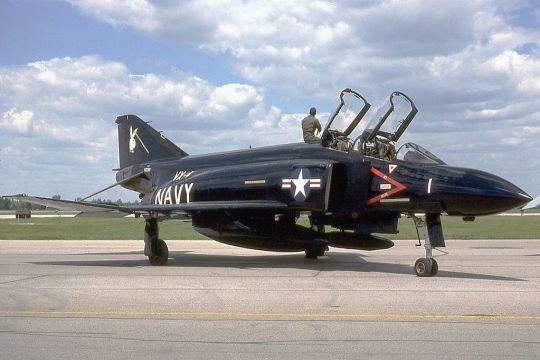
158358 | McDonnell Aircraft Corp. | F-4S Phantom II | USNavy
McDonnell Aircraft Corporation (USA) F-4J-46-MC Phantom, 158358 (MSN 4107) upgraded to F-4S. ''1985 : Third Playboy "Black Bunny" of VX-4 (''Vandy 1'') at NAS Point Mugu, Ca. 1987-1988 : 158358, VX-4 as XF-1. 158358, coded '1' VX-4, 'Bunny 1', seen at London AirShow, Ontario on 4 June 1988. WFU April 1989. Converted to QF-4S drone.'' Scanned from the single original 35mm slide, which is part of my own personal collection. It is therefore with pleasure that I share this photo with the people of FLICKR. Obviously, I also thank its author (T. Panopalis) to whom I give him all the credit.
25 notes
·
View notes
Text

22 August 1980. Death of James Smith "Mac" McDonnell, American aviation pioneer and founder of McDonnell Aircraft Corporation, later McDonnell Douglas.
@ron_eisele via X

12 notes
·
View notes
Text
Random fixation time!
Aircraft history has always been a hidden fixation for me. The recent Boeing shit had me looking back at what planes once were only to find shit like this has been going on since the fucking beginning!
So set the scene, it's the 50s and you need to fly from the UK to New York. Your choices are the Boeing Stratocruiser and others like it, uncomfortable, loud as balls prop planes that have seen a couple high profile crashes and others like it e.g. the Lockheed Constellation. All old transport planes from WW2 with few comforts
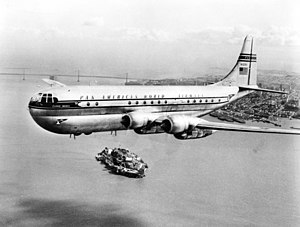

When out of the blue this absolute beauty arrives at the airport.
The de Havilland Comet
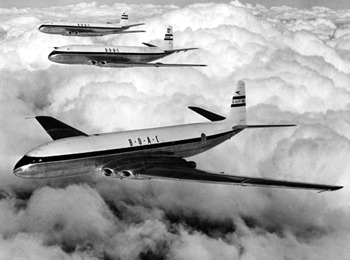

First ever jet airliner, gorgeous plane that compared to the above may as well be silent in flight. This was the UKs answer to how to stay alive in US dominated aerospace industry.
And it still sucked. It was so lightly built (to get airborne as the turbojets had as much thrust as a ferrets fart) that 2 fell apart in the air due to pressure cycle stress around the windows and hatches. They weren't as square as people think it was just shoddily built.
By the time it was fixed Boeing had the 707 and Mcdonnel Douglas the DC-8 so the UK was utterly out sold by those corporate giants (now one company so more a corporate hydra).
So aircraft manufacturers have been at it since day one. It also hurts as a reminder that the UK once actually had industry, this isn't a "life was better back when we had fucking coal pits and stiff upper lips post" it wasn't. Just a cry for what could have been. The 50s and 60s were a time of incredible innovation in aircraft and now everything's the same or falling to shit.
Also I want to live in the time line where flying boats were still viable

Saunders-Roe Princess my beloved ❤️
4 notes
·
View notes
Text
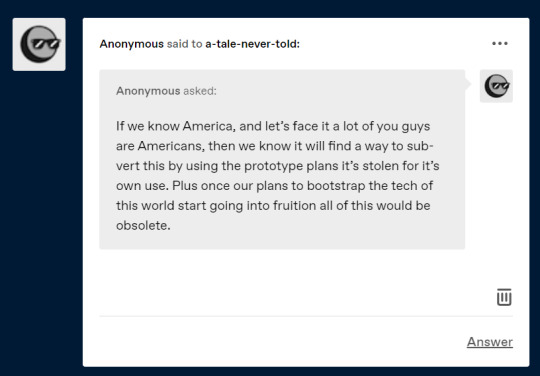
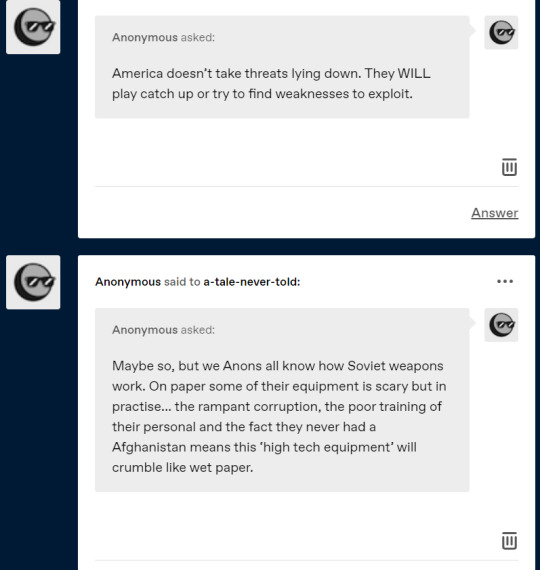
Donlion: It seems like we underestimated just how far the Soviet military programs are. They've been in the process since the 80s.
Burns: They're trying to pull what they did to us with the Sputnik artificial satellite in '57.
Donlion: Indeed. Luckily there are key factors working in our favor. One of which is that they don't have much of the materials or tech needed to build this stuff. And the second is that they aren't the only ones with the same thing.
Mckain: What do you mean by that?
Donlion: I'll let the Chairman of the Joint Chiefs explain because he knows about this more than I do.
Mullen: Thank you, Tom. As you see with the threats that we are facing, I and the other Joint Chiefs came up with a decision to build new equipment to counter the spread of Communist-made ones.
Mullen: I would love to discuss this with all of you now, but it's best that we talk about this separately so as to not put all of the intel in one area. Who knows if the Russians have bugged the meeting.
Mullen: I believe the best thing to keep our airspace in control is the NFJPR or National Fighter Jet Program. This is a top program designed to develop new fighters for our national defense and for the United States Armed Forces. Thanks to cooperation with the McDonnell Aircraft Corporation, we've gotten three prototypes that will replace our current models.
Petraeus: Well, at least we aren't far behind them now.
Obama: You said it.
#mod talks#barack obama#david petraeus#mike mullen#thomas e donlion#william j burns#john mckain#dr2#dr#twlight syndrome arc
2 notes
·
View notes
Text
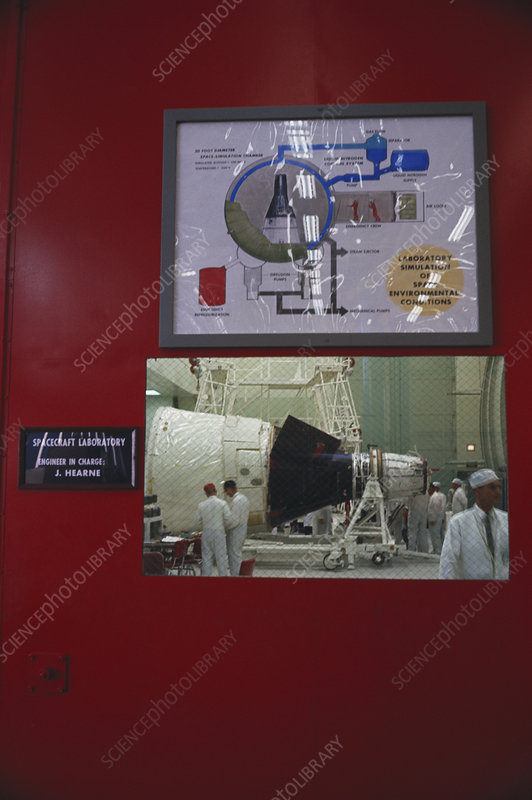
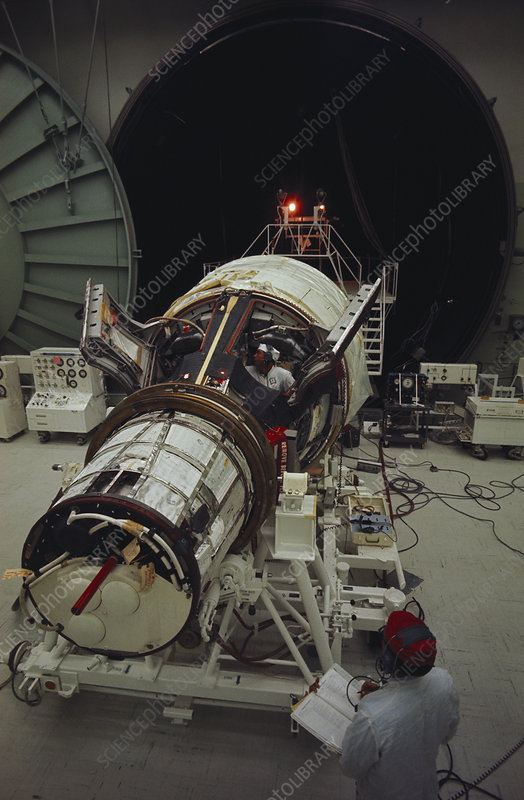
The Gemini spacecraft in a lab which simulates space conditions, at the McDonnell factory in St. Louis, Missouri.
Science Photo Library: C007/7842, C007/7841
#Gemini Capsule#Gemini Program#Project Gemini#St. Louis#Missouri#McDonnell Aircraft Corporation#Construction#1960s#my post
16 notes
·
View notes
Link
The article, authored by Peter Suciu, chronicles the evolution and significance of the McDonnell F-101 Voodoo, an advanced military aircraft developed during the Cold War. Originally designed as a long-range escort for Strategic Air Command bombers, the F-101 was adapted into a long-range interceptor, nuclear strike aircraft, and tactical reconnaissance plane. Notable for its speed and altitude capabilities, the Voodoo's design stemmed from the XF-88 prototype. The article highlights its various configurations, including the single-seat F-101A, the two-seat F-101B, and the RF-101 reconnaissance models. It discusses its operational roles and deployments by the United States Air Force, Canadian Air Defence Group, and Taiwanese pilots, particularly during crises like the Cuban Missile Crisis and the Vietnam War. The Voodoo’s legacy is preserved in numerous museums across the globe.
#McDonnell F-101 Voodoo#Cold War#United States Air Force#Strategic Air Command#tactical reconnaissance#interceptor aircraft#nuclear deterrence#supersonic speeds#Vietnam War#aerial refueling#RF-101 variant#F-101B variant#radar systems#McDonnell Aircraft Corporation#Mach 2#photo-reconnaissance missions#fighter jet#1950s aviation technology#military aviation history#jet aircraft development.
0 notes
Text

airsLLide No. 4351: I-ATIH, McDonnell Douglas DC-9-32, ATI Aero Trasporti Italiani, Milano-Linate, February 21, 1990.
The similarities in corporate design, namely in the stylized, two-colors «A» in the tailfin, illustrate the close relationship between parent Alitalia and its domestic subsidiary ATI. Until its full integration into the parent in 1994, ATI would heavily rely on the DC-9-family of aircraft, with the MD-82 first supplementing and later replacing the classic DC-9-30 in use since 1969.
0 notes
Text

For those who haven't seen it on the news, or social media, Mi Amigo was a USAAF B-17 Flying Fortress that was returning heavily damaged from a raid. It crashed into trees in Sheffield's Endcliffe park. At the time a group of kids were in the park, having met up for a prearranged fight! One of them, a gentleman called Tony Foulds, witnessed the pilot turning the aircraft to avoid the kids and sacrificing himself and his crew to save them. Memorial To The Fallen As he grew up, Tony started to tend to the memorial that had been placed in the park. A labour he has undertaken for 6 decades. This was unnoticed by all except a few locals. Until a chance meeting with Dan Walker. Host of a radio programme for the BBC he was jogging through the park. Noticing Tony sweeping the monument they got to talking. Tony explained what he was doing and why. He told Dan his ambition was for a memorial flypast to commemorate the anniversary of the crash. Dan told him to "Leave it to me" and decided to help. He tweeted about the meeting, asking if anyone knew how much the red arrows would cost. Dan found the story going viral, with both U.K. and U.S. military chiefs contacting him regarding the request. A Memorial Flypast The upshot was that on 22nd February, a number of both countries military craft flew over the park in tribute. The final flyover was 4 Mcdonnell Douglas F15 Fighting Eagles, which flew the "Missing Man" formation. This is a poignant tribute, where the flight approaches with 4 craft in close formation. One of the middle aircraft suddenly breaks away and climbs vertically, leaving the rest of the formation to fly on with an obviously missing place. This is to honour a pilot, who can no longer fly the formation due to his death, and was a fitting tribute to the heroism of a long ago pilot. F15 Strike Eagles Fly The Missing Man Formation WWII Era Dakota Transport Eurofighter Typhoon Fighter Aircraft Saluting The Mi Amigo Now you might well ask, what has any of this got to do with a company specialising in Corporate Entertainment. Well, to be honest, nothing really, other than since I obtained my Private Pilots Licence I have had an increasing interest in aviation. Oh, and if it wasn't for men like the crew of that B17, this blog might well be called Zuckerwatte Verrückt (That's German for Candy Floss Crazy). Read the full article
0 notes
Text
0 notes